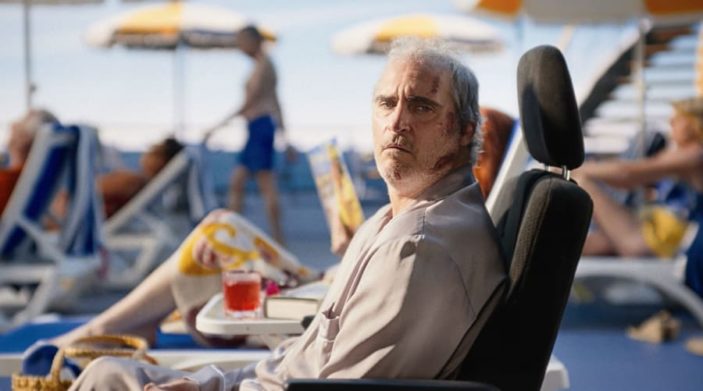
Beau is Afraid tells the story of Beau Wassermann (Joaquin Phoenix), a taciturn, socially-awkward middle-aged man who is the son of renowned and wealthy businesswoman Mona (Patti LuPone). He currently lives a broken existence, with a dilapidated apartment, constant therapy sessions (led by Stephen McKinley Henderson) and sleepless nights due to the barrage of sounds in the nightlife.
But when Beau hears news of a sudden shock within the family, he reluctantly sets off to travel the long journey home to see his mother. However, he must confront his greatest fears, oddball characters and his past baggage in order to make it to his destination.
Beau is Afraid is directed by Ari Aster, the visionary filmmaker behind such acclaimed horror films as Hereditary and Midsommar. With his assured handling of tones, a striking visual eye and his fascination with conveying the flaws and trials that humanity faces, one can describe his work as provocative.
In the case of his latest film, he changes gears and has decided to make, in his own words, a nightmare comedy. The runtime of the film is a mammoth one-hundred and seventy-nine minutes and it is funded by A24; a popular indie film entertainment studio that has earned some cache over the past decade with its adherence to films that veer toward the abnormal. Considering all of the above and correlating it to its seemingly simple synopsis, the film can be seen as meretricious or self-important.
Thankfully, Beau is Afraid manages to dodge almost all those potential problems. The main reason is due to how Aster manages to tip-toe the fine line between being comedically serious and being self-serious. One of the arguments that is brought up with Aster’s prior work is his indulgence in conveying the suffering of his characters. In fact, the argument is so extensive that some people have thought that Aster has a problem with empathy.
The irony over the argument of Aster’s supposed lack of empathy for his characters is that in order for the humour in Beau is Afraid to work, one must feel a sense of empathy for Beau. He has multiple encounters with predicaments involving a frightening subversion of American suburbia, an off-kilter look on city-wide crime, and a detour into grand theatre of self-reflection. Aster milks Beau’s paranoia for black humour and it largely works due to how heightened and ridiculous it all is.
The timing of the humour is razor-sharp as Aster knows what constitutes gallows humour often involves suspense and escalation of tension. One scene involving an intruder that tries to hide from Beau while he is trying to relax in a bathtub is excruciatingly funny. Even with the surrealistic, intricate, and remarkable visual and production design (including stellar work from collaborators like cinematographer Pawel Pogorzelski and editor Lucian Johnston) that pervades Aster’s prior work, he never treats the story or Beau’s suffering with a level of pretentiousness.
A huge credit must be given to the ensemble cast, who treat the material with the perfect level of being deadpan that accentuates the gonzo plot that surrounds them. With scene-stealers like Nathan Lane (disarmingly jovial), Parker Posey (disarmingly sensual), Patti LuPone (disarmingly passive-aggressive), Amy Ryan, Hayley Squires (disarmingly understated), Richard Kind and especially Kylie Rogers (disarmingly angsty— is anyone sensing a pattern here?); they all deliver stellar, memorable work. Phoenix is the perfect straight man for all the things Aster throws at him. With a vast range of emotions that veer on fear, puzzlement, shock and pensiveness, Phoenix makes the journey of Beau felt and delivers with comedic and dramatic aplomb.
Overall, Beau is Afraid is an out-of-the-box comedy that is excruciatingly funny; a refreshing change of pace for Aster that proves that horror and comedy can go together in perfect harmony. Highly recommended.
FIVE STARS (OUT OF FIVE)
Beau is Afraid is in cinemas now.
